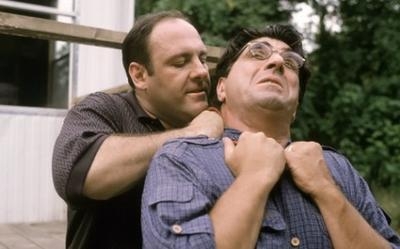You have /5 articles left.
Sign up for a free account or log in.

Scene from the "College" episode of "The Sopranos"
Wikipedia
Remember that episode of The Sopranos? I mean the one when Tony takes Meadow on a college tour in Maine and, while she interviews, he murders a former wiseguy who flipped and found cover in the Pine Tree State.
Well, this past month has made the people inside the world of college admissions look like the mafiosi. Wealthy families, college coaches, standardized-test proctors and an independent college counselor-cum-criminal mastermind used bribery, cheating and fraud to facilitate the admission of scores of students at elite universities. We’ve all heard the news. You have an opinion on it, and on every dinner date since the story broke, you’ve discussed the sordid details of Operation Varsity Blues.
A few of the Democrats running for president in 2020 have also started talking about college -- the Electoral College, that is. Elizabeth Warren, Kamala Harris, Pete Buttigieg -- they all have expressed an openness to abolishing the institution. While the college admissions scandal and the criticism of the Electoral College seem to have nothing more than a word in common, it might be worth examining a shared feature.
Both demonstrate the danger when outsize influence is possessed by a very limited number of actors. The Electoral College makes this point immediately clear. Despite winning nearly three million more votes than Donald Trump, Hillary Clinton lost the election due to three states and a relatively small number of votes. Michigan, Pennsylvania and Wisconsin tipped the contest in the Electoral College to Trump, though he won each of those states by less than a percentage point and by roughly 78,000 votes in total -- about the same number of people who turn out to watch home football games at the University of South Carolina.
Instead of appealing to the concerns of a wide swath of Americans, the Electoral College reduces the contest for the presidency, a federal office, to a handful of battleground states. In 2016, 94 percent of the campaign stops of both candidates took place in just 12 states; almost 60 percent happened in only four. Twenty-four states, plus the District of Columbia, received zero campaign visits from the presidential candidates in 2016. Democrats in Tennessee or Republicans in Massachusetts not only don’t get a visit from their candidate of choice, but their vote hardly matters at all. Given the winner-takes-all mechanics of our electoral system, voters inside clearly defined red and blue states don’t matter; only the toss-up states do. If Republican chicanery hasn’t already suppressed your vote, there’s a good chance the Electoral College will.
Likewise, Operation Varsity Blues masks the way most Americans pursue higher education. Much has already been written about its significance. The criminal conspiracy, though extreme, has brought attention to the more mundane ways -- such as legacy benefits, standardized tests and athletic recruitment -- that economic and racial privilege influence selective college admissions. There’s real value in exposing the inequities in selective college admissions.
There’s also real value in broadening the conversation about higher education beyond selective colleges. Just as a few states swung the 2016 election, Operation Varsity Blues illustrates how a very small number of hyperselective colleges dominate our cultural conversation about higher education. Only 4 percent of American undergraduates attend institutions with acceptance rates below 25 percent. When columnist Frank Bruni joked that Stanford University had become too selective to admit anyone at all, he wasn’t far from describing the actual number of undergraduates who attend colleges with single-digit acceptance rates, which is well under 1 percent of all college students. And yet, Stanford and other elite universities hog the headlines and control the discourse about postsecondary education in the United States. Operation Varsity Blues is the latest case in point.
The consequences are many. For one thing, by focusing on the same two dozen or so elite private colleges, we ignore some key trends in higher education. We don’t, for example, attend to the dramatic reduction in taxpayer support for state universities, funding cuts that increase tuition costs and undermine the public mission to educate in-state students. We miss the growing problem of food insecurity and homelessness among college students. We avoid that nearly half of college students attend community colleges and a quarter are enrolled just part-time -- students living a very different reality than those attending elite universities. And we don’t end up talking enough about ballooning student debt, the fastest growing household debt category since the 2008 recession and the debt segment with the highest delinquency rate.
When we allow hyperselective institutions to dominate the discourse around higher education, we do make some contributions to the lived experience of teenagers. We contribute to the growing problem of anxiety and depression in young adults, who see college admission as a barrier and not as an opportunity. We set up adolescence and secondary school as a transactional rat race, teaching teens to navigate their lives not by their sense of purpose, their imagination and their values, but by what looks best on their résumés. We add to the prestige-college-industrial complex, the very set of conditions that led dozens of already wealthy people to lie, cheat and steal their way into universities they saw as flashy status symbols, not institutions of higher learning.
Just as the Electoral College diminishes the power of the ballot box, our collective focus on elite colleges is antidemocratic. It’s a distraction from what the majority of Americans experience and, like the Electoral College, needs correcting.
Tony Soprano approached solutions to problems differently than I might. I hope we can all agree to expand the voices we hear from -- both in how we vote and how we achieve a higher education. If not, fuhgeddaboutit.




